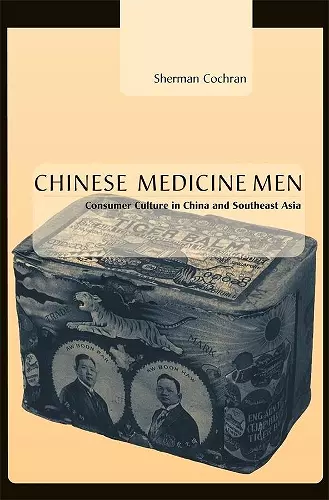Chinese Medicine Men
Consumer Culture in China and Southeast Asia
Format:Hardback
Publisher:Harvard University Press
Published:29th Jun '06
Currently unavailable, and unfortunately no date known when it will be back

The first full-length study of one of the largest industries in prewar China, this is a thoughtful, accessible, and thoroughly welcome book. Sherman Cochran offers one of the very few works that show us Chinese businesses not only successfully using techniques of their own or modifying Western ones, but pioneering innovations that would later succeed in other parts of the world and are often thought to be Western in origin. Chinese Medicine Men will be very well received among readers of the history of modern China, international business, consumerism, and globalization. -- Kenneth Pomeranz, author of The Great Divergence: China, Europe, and the Making of the Modern World Economy An original and important book. Cochran shows that Chinese entrepreneurs in the pharmaceutical and Chinese medicine industry--several of them barely literate--created a modern consumer culture and penetrated domestic and Southeast Asian markets more deeply than Western multinationals did. He has unearthed remarkably fresh materials about Chinese business practices during the Republic and brought together economic and organizational analysis with culture and politics in a new and stimulating way. -- Prasenjit Duara, author of Rescuing History from the Nation: Questioning Narratives of Modern China
Cochran reconsiders the nature and role of consumer culture in the spread of globalization and illuminates enduring features of the Chinese experience of consumer culture. The history of Chinese medicine men in pre-socialist China, he suggests, has relevance for the 21st century because they achieved goals that resonate with their successors today.
In this book, Sherman Cochran reconsiders the nature and role of consumer culture in the spread of cultural globalization. He moves beyond traditional debates over Western influence on non-Western cultures to examine the points where Chinese entrepreneurs and Chinese-owned businesses interacted with consumers. Focusing on the marketing of medicine, he shows how Chinese constructed consumer culture in China and Southeast Asia and extended it to local, national, and transnational levels. Through the use of advertisements, photographs, and maps, he illustrates the visual forms that Chinese enterprises adopted and the far-flung markets they reached.
Cochran brings to light enduring features of the Chinese experience with consumer culture. Surveying the period between the 1880s and the 1950s, he observes that Chinese businesses surpassed their Western counterparts in capturing Chinese and Southeast Asian sales of medicine in both peacetime and wartime. He provides revealing examples of Chinese entrepreneurs’ dealings with Chinese and Japanese political and military leaders, particularly during the Sino–Japanese War of 1937–45. The history of Chinese medicine men in pre-socialist China, he suggests, has relevance for the twenty-first century because they achieved goals—constructing a consumer culture, competing with Western-based corporations, forming business-government alliances, capturing national and transnational markets—that their successors in contemporary China are currently seeking to attain.
The first full-length study of one of the largest industries in prewar China, this is a thoughtful, accessible, and thoroughly welcome book. Sherman Cochran offers one of the very few works that show us Chinese businesses not only successfully using techniques of their own or modifying Western ones, but pioneering innovations that would later succeed in other parts of the world and are often thought to be Western in origin. Chinese Medicine Men will be very well received among readers of the history of modern China, international business, consumerism, and globalization. -- Kenneth Pomeranz, author of The Great Divergence: China, Europe, and the Making of the Modern World Economy
An original and important book. Cochran shows that Chinese entrepreneurs in the pharmaceutical and Chinese medicine industry--several of them barely literate--created a modern consumer culture and penetrated domestic and Southeast Asian markets more deeply than Western multinationals did. He has unearthed remarkably fresh materials about Chinese business practices during the Republic and brought together economic and organizational analysis with culture and politics in a new and stimulating way. -- Prasenjit Duara, author of Rescuing History from the Nation: Questioning Narratives of Modern China
This is a captivating book. Chinese Medicine Men moves beautifully from one story to another, and it is a must read for students and scholars of modern China and Southeast Asia, particularly those who operate in the socio-economic arena. -- Zheng Yangwen * Journal of Southeast Asian Studies *
Chinese Medicine Men is an elegant examination of complex cultural and commercial change in modern China...For scholars of modern China and, to a limited extent, Southeast Asia, this book suggests new approaches to the historical interpretation of this period. In particular, it provides strong evidence that native pharmaceutical companies were not severely restricted by Nationalist exactions and Japanese oppression, but rather, successfully navigated treacherous and uncertain terrain to maintain their markets Cochran’s work indicates the need for additional research focuses on native companies in other trades, which may also have flourished despite the upheavals of this turbulent period. -- Daniel J. Meissner * Canadian Journal of History *
- Winner of Joseph Levenson Book Prize 2008
- Nominated for John K. Fairbank Prize in East Asian History 2007
- Nominated for Hagley Prize in Business History 2007
ISBN: 9780674021617
Dimensions: unknown
Weight: unknown
288 pages